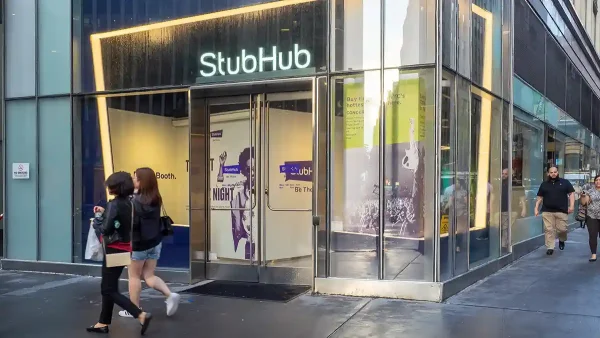
A fan holds their mobile phone up to a scanner outside of an event, illustrating the Ticketmaster Safetix system
Ticketmaster SafeTix Take Central Role in DOJ’s Monopoly Lawsuit
Ticketmaster markets its “SafeTix” system as a safe and secure way for fans to access tickets to live events. But the Department of Justice has framed it in a far different light in its antitrust lawsuit against Live Nation Entertainment and its subsidiary, alleging that the true business purpose of SafeTix is to stifle competition in the ticketing industry, extend its dominance in the market, and collect valuable consumer data.
SafeTix, the DOJ argues, is a prime example of how “Ticketmaster deploys its vast power and network to protect its monopoly,” according to the amended complaint filed last week along with the announcement that ten additional states were joining in the lawsuit seeking to break up the entertainment giant.
“Ticketmaster has added SafeTix to its suite of products and services in a manner that protects its position in primary ticketing, expands its position in secondary ticketing, and undercuts the ability of rival ticketers to compete in either aspect of ticketing,” it continues.
Introduced as a part of Ticketmaster’s “Presence” suite of tools more than five years ago, “SafeTix” involves the usage of a so-called “dynamic” barcode system that is locked to the mobile app of Ticketmaster or the specific team/venue of the event being serviced by the Ticketmaster system.
Though it has reportedly been reverse-engineered by someone who did not care for its ability to kill competition, SafeTix is designed to force all ticket transfers to occur within the Ticketmaster platform by introducing an ever-changing barcode that cannot be captured via a screenshot. The constantly changing barcodes introduce uncertainty about whether a ticket can be successfully transferred, thereby discouraging fans from using alternative services.
This system forces both buyers and sellers to create Ticketmaster accounts, further entrenching the company’s market position. By complicating the transfer process, SafeTix limits the ability of competitors to offer a seamless resale experience. This, in turn, discourages the entry of new competitors and diminishes the effectiveness of existing ones, as fans are less likely to use secondary platforms that cannot guarantee smooth ticket transfers. It has also enabled event organizers to eliminate competition from resale entirely – banning resale or transfer outside of their preferred systems.
FURTHER READING | Foo Fighters Weaponize Ticket Restrictions for Upcoming Shows
| A Generation Later, Pearl Jam Evolves from Fighting Monopoly to Lobbying For It |
| SafeTix System Used to Lock Out Hundreds of Fans from Black Keys Show |
“Ticketmaster’s own documents show that a primary motivation behind its push for a non-transferable digital ticket was to make it more difficult for a fan who wishes to buy or sell a SafeTix-encrypted ticket through a secondary platform to use a rival platform,” the complaint notes.
“One document from a Ticketmaster executive meeting in 2014, for example, describes the “non-transferable digital ticket” as a “game-changer.” Another document from 2017 describes the rotating barcode as a “product enhancement[ ] for market share.”
Another significant aspect of the SafeTix system, as detailed in both complaints, is its role in data collection. Ticketmaster is alleged to have used SafeTix to significantly increase the size of its consumer database, gaining detailed information on not just the ticket purchaser, but also the individuals they transfer tickets to. This expansion of its data pool gives Ticketmaster a substantial advantage over competitors, as it allows the company to tailor its marketing and sales strategies more effectively.
FURTHER READING | ASM Global Extends Ticketmaster Deal on Strength of Data Harvesting Capabilities
| Ticketmaster House Testimony Contradicts Prior Statements And Its Privacy Policy |
The amended complaint, in particular, underscores this point with a direct quote from Live Nation’s CEO, who reportedly stated that SafeTix allows the company to know not just the person who bought the ticket, but also the three people attending the show with them—a level of consumer insight that was previously unavailable.
Within the industry, the true nature of Ticketmaster’s mobile-locked system have been an open secret since their introduction. Consumer advocates have long pushed for protection against the forced use of such systems, though against fierce resistance powered by Live Nation’s enormous lobbying apparatus at both the state and local levels.
“Prohibiting ticket transferability as a way to prevent scalping is a cure worse than the disease,” wrote John Breyault of the National Consumers League in an Op-Ed published by The Hill in support of the BOSS and SWIFT Act. “Fans often have to buy tickets for shows months in advance. Unexpected events can prevent someone from attending the show. Forcing consumers to eat the cost of those tickets is patently unfair. By protecting ticket transferability, the BOSS Act will make sure consumers can sell or give away their tickets when life inevitably intervenes and they can’t attend an event. It will also prevent Ticketmaster from introducing anti-competitive restricted-transfer tickets, which prevent resale on any exchange where Ticketmaster can’t control the prices and set the rules.”
TicketNews has not received a response from Live Nation or Ticketmaster regarding the characterization of SafeTix as outlined by the DOJ vs. its marketing materials.






